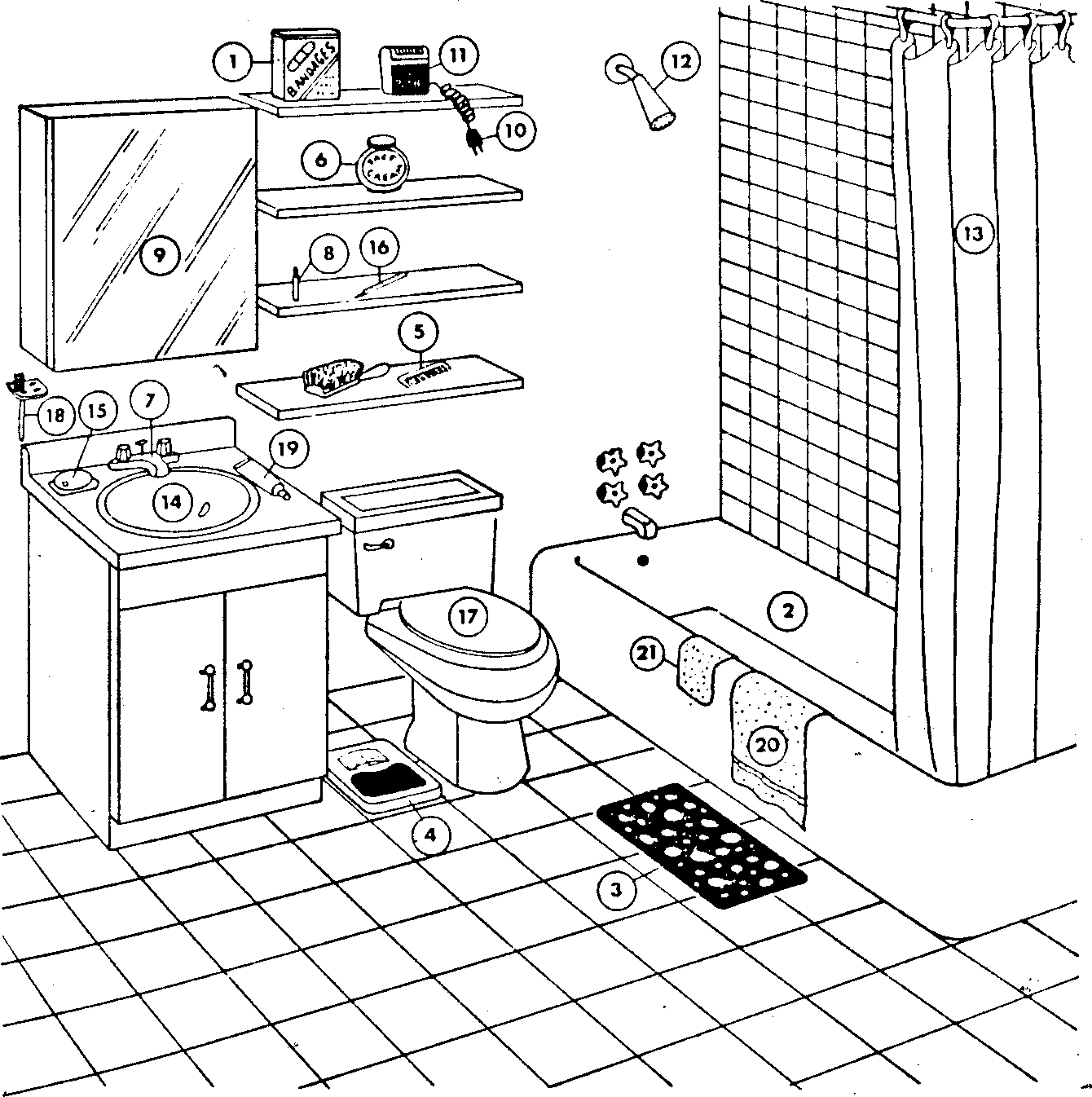Пособие по обучению практике устной и письменной речи (начальный этап) на английском языке Под ред. О. В. Серкиной
 Скачать 17.03 Mb. Скачать 17.03 Mb.
|
Living Room1. armchair 7. clock 13. (loud) speaker 19. rug 2. bookcase 8. cushion 14. picture 20. sofa 3. bookshelf 9. fire 15. radio 21. telephone 4. carpet 10. fireplace 16. record 22. television 5. ceiling 11. floor 17. record player 6. chair 12. lamp 18. rocker/ rocking chair I 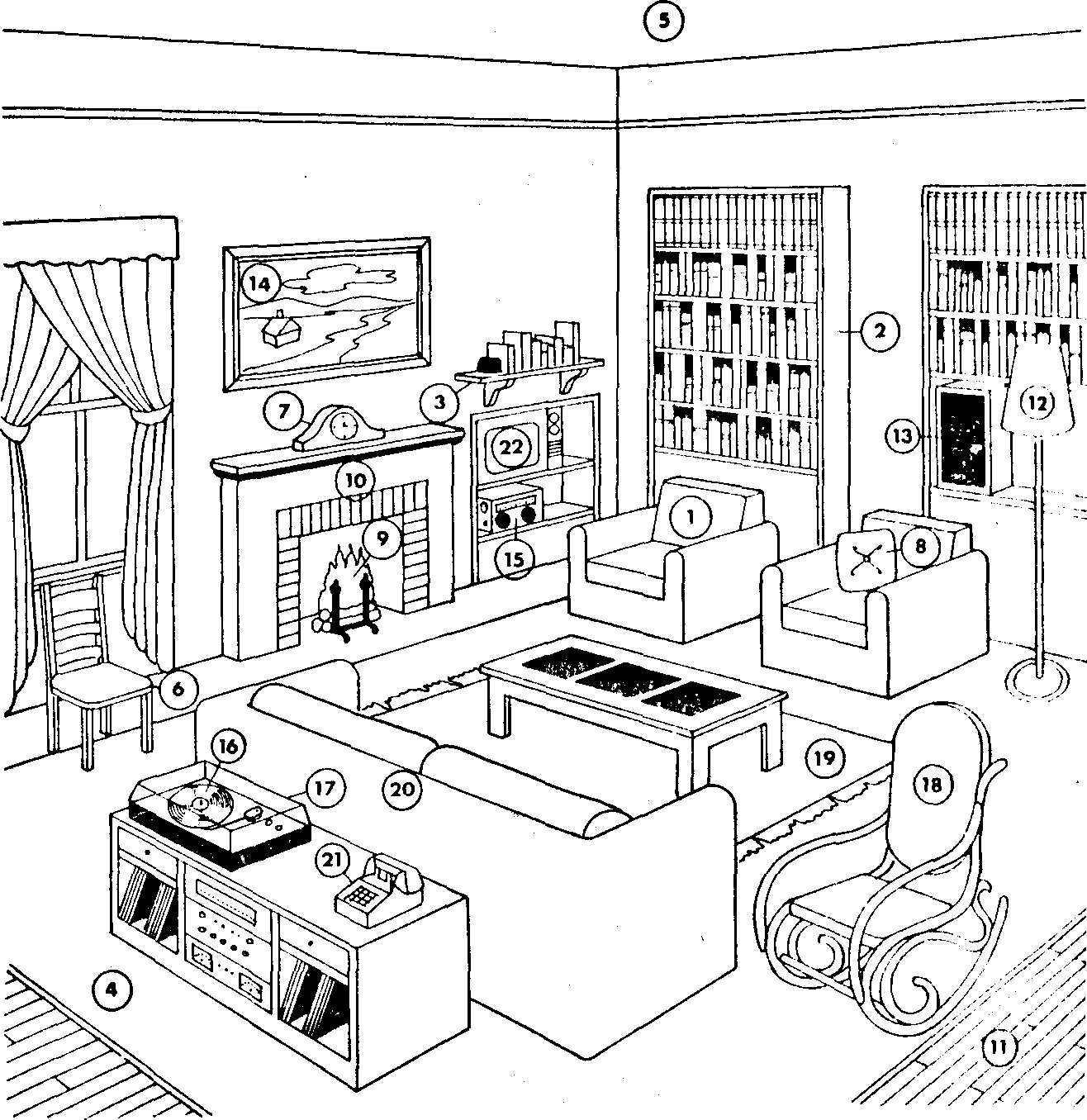 n the living room you can also find or use the following things: suite (of furniture), display cabinet unit, settee / couch/ sofa, carpet brush, floor cloth/cleaning rag, carpet sweeper, vacuum cleaner, electric iron, ironing table, Note: settees are found in ‘lounges’ or ‘living rooms’ (these words are used by people of no higher that middle-middle class); sofas can be found in ‘sitting rooms’ or ‘drawing rooms’ (these words are used by people from upper-middle class or above). Bedroom 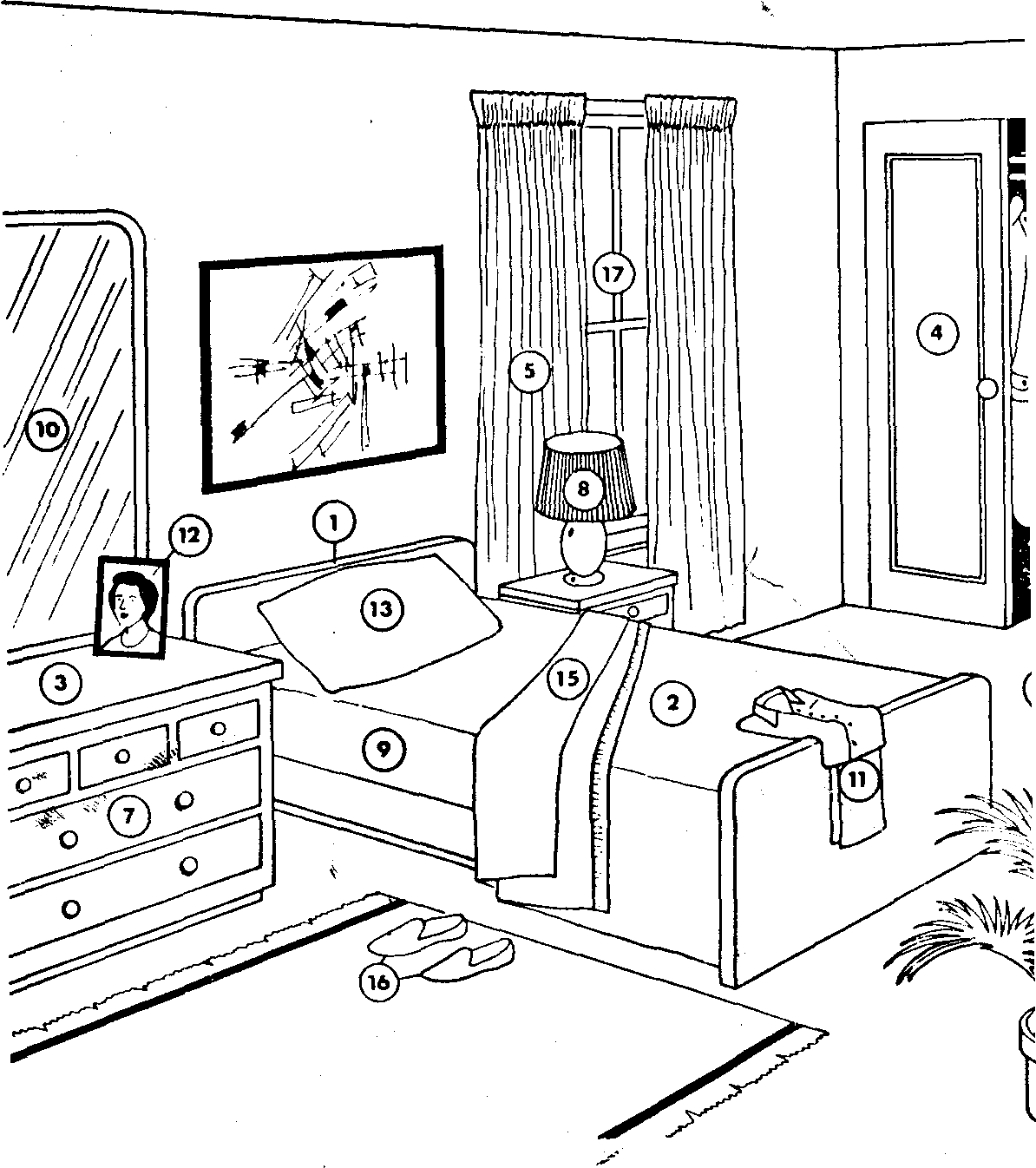 1. bed 2. blanket 3. chest of drawers 4. closet 5. curtain 6. door 7. drawer 8. lamp 9. mattress 10. mirror 11. pajamas 12. photo 13. pillow 14. plant 15. sheet 16. slippers 17. window In the bedroom you might also need the following things: duvet, bolster, pillowcase / pillowslip, bedspread, double bed, sconce, bedside table, wardrobe, king size bed Bathroom
16. thermometer 17. toilet (to flush the toilet) 18. toothbrush 19. toothpaste 20. towel 21. washcloth In the bathroom you may also find the following things: shampoo, sponge, linen bin, pumice, towel rail, toilet roll holder, toilet paper (AmE. bathroom tissue), toilet lid, toilet seat, cistern, flushing lever, stepladder, toilet articles 1.6. Write the words for each unit in the pictures without looking back at the pictures in the previous activities. Picture A Picture B 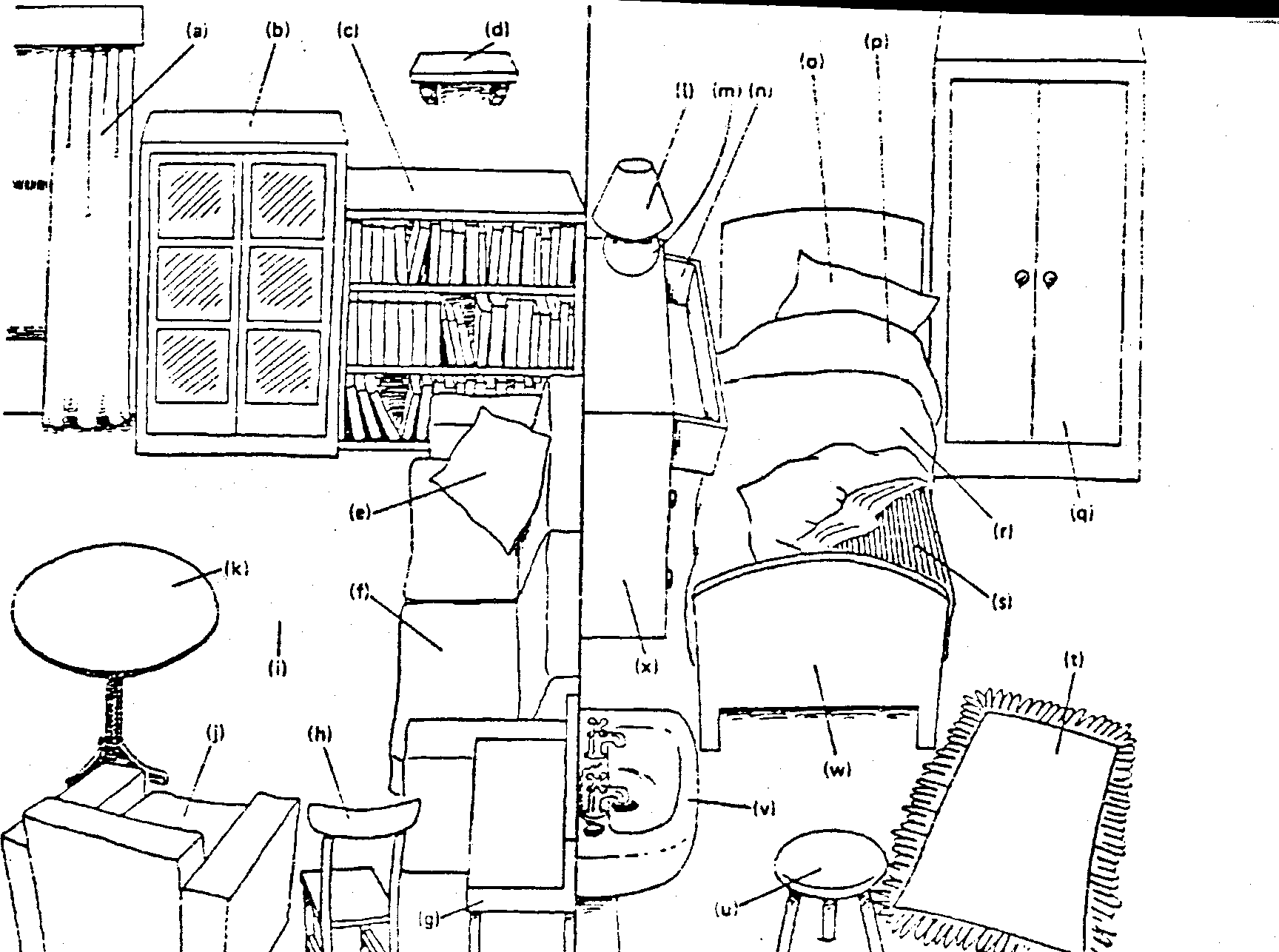
H 1.7. a) Read the text about the housewarming. b) Pick up from the text all the facts about the old Russian rites connected with housewarming. Do the Russians still observe these traditions? ousewarming Housewarming is a joyous holiday. The establishment of a new house and hopes for a new life, therefore a housewarming, especially in old Russian life, has always been accompanied by solemn rites. In the good old days everyone had their own house. And if they built a new house and went to live in it, first they would call a priest, who would sanctify the place. Only then would they invite friends and relations to look around, give advice and share the host’s happiness. Guests always came to a housewarming with bread and salt. This symbolized abundance and good fortune in the house and family. Some of the old rites have been preserved to this day, for example, letting a cat into the new house, nobody crosses the threshold until the cat has wandered through all the rooms, found a place it likes and sat down. In this very place the hostess would put her bed. And when a child was born into the family, this place was cleared to make room for a cradle. It was thought to be the healthiest place in the whole house. It has now been demonstrated by scientists that this is true. In the old days guests would take a kneading-trough to a housewarming and roll three loaves of bread, then they would see how those loaves would lie, and thus determined how they should sit in the house. But above all, it was necessary to know how to choose a site to build a house. For this, too, many methods of divination were used. For example, to determine the quality of the soil in the place where they planned to build the house, oak-bark would be laid on the ground for 3 days. On the forth day they would pick it up and see what was under it. If they found a spider or an ant, the place was considered bad for building a house on it. But if they found worms, they could confidently get on with the construction. These old signs were probably based on something if they didn’t die out over the course of centuries and were used by professional builders. Three baked loaves were also used to determine the place. People would drop them as if by chance onto the earth and see how they lay. If all three lay with their crust uppermost, the place was good for building, be it a simple wooden hut or a stone mansion. But if the bread fell crust downwards, there could be no question of building anything. This place became a vacant plot and nobody wanted it. When the house was built and the guests invited after the priest had blessed the corners of the house, a feast would begin. During the feast the floor of the new house would be spread with grass or hay so that it wouldn’t be bare, so that the couple would be prosperous and have many children. The banquet table would be covered with a big tablecloth on which before all the food and drink would be placed the bread and the salt that the guests had brought. And after the feast each guest had to give the host a present. What kind of present to give wasn’t prescribed, but it had to be something really necessary for the household, and not a knick-knack. s c) Find synonyms in the text for the words below. o, merry, to keep, fortunetelling, to continue, accidentally, to sanctify; t d) Explain the meaning of the words below. o look around, abundance, uppermost, downwards, feast, prosperous, knick-knack. 1.8. Study the following metaphors and idioms relating to homes and lifestyles (a) and gardening (b). Think of any Russian idioms or proverbs with the word “house” or “home”. Explain their meaning in English. a) Home and Lifestyle Metaphors
b) Gardening Metaphors The new boss is planning to weed out (=get rid of) older or less experienced staff. The government will probably have to prune back (=cut/limit) its proposals. At last she is reaping the reward of (=is getting results from) all her years of study. The journalists have dug up (=have discovered) some interesting facts. The idea was germinating (=was beginning to develop) while we were on holiday. Out-of-town shopping centres have been sprouting (=appearing quickly in large numbers) all over the country. Our business is flourishing (=doing very well). A deciduous tree sheds (=loses) its leaves. People can shed employees/traditions/worries/inhibitions/weight. Plants fade, wither, shrivel and wilt when they die. These verbs can all be used metaphorically: Hopes of finding survivors are fading (=becoming smaller). High inflation means that our savings are shriveling (=becoming less). It was so hot in the classroom that the students were starting to wilt (=lose energy). A glance/look/remark can wither or be withering (=make the recipient feel scorned). T 1.9. a) Wherever we live – in our own or rented flat or house – we all perform various household activities throughout the day, some of which might not be quite successful. If there is a problem with a machine or thing that we use, e.g. TV, light, washing machine, computer, food mixer, etc., we often use expressions from the list below. here’s something wrong with the TV. (= there is a problem with it.) The light isn’t working. (= not functioning/ there is no light) The shower’s not working properly. (= it is functioning but not very well) The telephone is out of order. (= not in use/ not functioning)- this phrase is mostly used when a public machine is not working. b) Read the summary of Paul’s Monday. Translate the bold-faced words and be ready to describe your day of misfortunes. Yesterday morning Paul had a lot of problems. First, he dropped a cup and it broke. It was his girl-friend’s favourite cup. He got another cup, made coffee, and then spilt it. It ruined his T-shirt because there was a large coffee stain on it. He decided to make some toast, but he burnt the first piece, then he realized that he’d run out of bread. He didn’t leave home in a good mood, moreover he was hungry. After Paul went out, things got worse. He left home with a ten-pound note in his pocket, and walked to a bus stop. Unfortunately, he was a bit late and the bus was a bit early, so he missed the bus. While he was waiting for the next one, he got out his walkman, but the batteries had run out. When the bus arrived, he got on and put his hand in his pocket – no ten-pound note – he had lost his money. The driver told him to get off. He didn’t want to be late for school, so he started running. Moments later, he saw a dog, but not its lead – he tripped over the lead. He got to his feet, carried on to school, then he realized he had left his bag on the bus. And he was late for school in the end. (We should use the word “leave”, not “forget” when we say where something it: I left my umbrella at home. But: I’ve forgotten my umbrella today.) 1.10. a) Match each of the following tools with the correct picture below. b) Complete each of the sentences below with the correct tool from the list. spanner hammer axe saw screwdriver spade penknife chisel fork drill scissors mallet jack rake 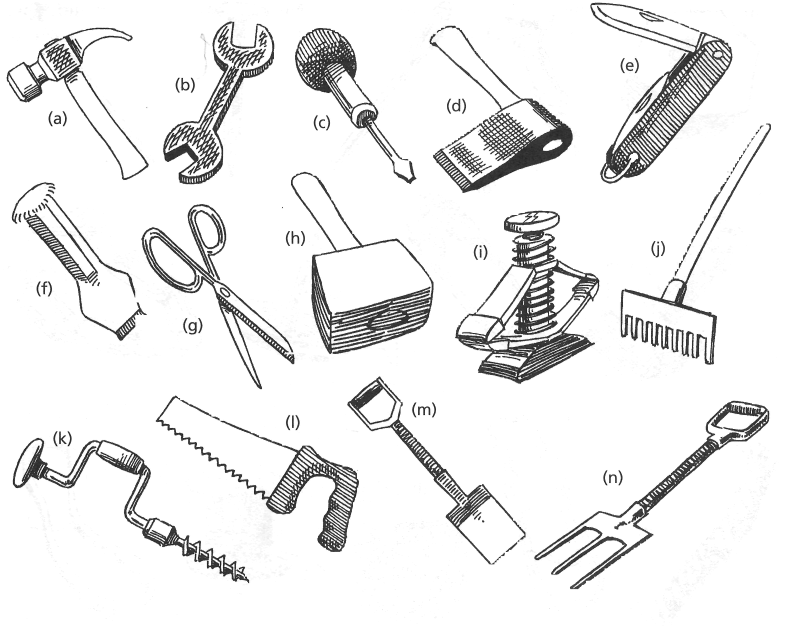 (a) We cut paper or cloth with a pair of______. (b) We put in and take out screws with a______. (c) We dig holes in the ground with a______. (d) We make holes in wood, metal or stone with a______. (e) We raise a car to change a wheel with a______. (f) We knock nails into wood with a______. (g) We cut down trees with an______. (h) We carve wood or stone with a______. (i) We hit a chisel with a______. (j) We collect dry leaves and make earth level with a______. (k) To cut a string and other things, we carry in our pocket a folding______. (l) We turn the earth over in the garden with a spade or______. (m) We saw wood with a______. (n) We tighten or loosen nuts and bolts with a______. |

